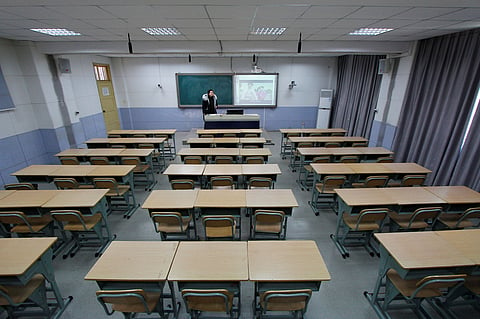Winds Of Change In Catholic Convents Too
PUNE || St Joseph’s High School, Pashan, Pune is one of at least 13 schools run by the Catholic nuns of the Convent of Jesus and Mary in India. The congregation was founded by Claudine Thevenet, born in Lyon, France in 1774; as a 15-year-old, Thevenet witnessed the French Revolution of 1789; a few years later, two of her brothers were murdered in revenge during the siege of Lyons.
A priest who found two abandoned children shivering in the cold left them in the care of the young Claudine Thevenet, and thus was born the Convent of Jesus and Mary, which Thevenet founded in 1818.
The congregation today runs schools across the world. On the website of The Catholic Infant School and Nursery in UK, is the motto of this religious congregation: “The first aim of the congregation was to receive poor children and care for them, until they were twenty, giving them working skills and elementary education, as well as a solid religious and moral formation.
But Claudine and her sisters wanted to do more and so they founded a boarding school and welcomed young girls of richer families. The apostolic aim of the congregation was therefore the Christian education of all social classes, with preference for poor children and young girls.”
But why would one recall this history, over 200 years later? One parent whose child is admitted to the St Joseph’s High School in Pashan claims he paid Rs 3 lakh as donation; another said he paid Rs1 lakh, but the admission did not come through because the man to whom he paid the money was an unreliable agent who could not be traced later.
A schoolteacher who lives in Baner (and does not teach at St Joseph’s), a devout Catholic, says she too has heard of the donations. “I cannot believe it, I do not want to believe it,” she says.
One Sunday, this reporter went to the school, and met Reverend Sister Mark, former principal of the school. “All lies,” Sr Mark said. “We don’t take any donations. But we do sometimes admit students on the basis of recommendations from the state education department.” The school is affiliated to the Maharashtra State Board of Secondary Education and the secondary section of the school receives aid from the state government.
Even though Sr Mark was aware of the talk of donations, she seems not very keen to get to the bottom of the matter and stem the rumours. She mentioned that agents sometimes seek donations from people seeking admission for their children, but asserted that the school has nothing at all to do with these agents.
At the Marathi-medium Aksharnandan School, started in Pune in 1992 by a group of people seeking to inculcate the values of collaboration rather than competition in children, the annual fees are on display on the website. Aksharnandan does not receive any funds from the state government, and is called an “unaided” school. Donations are invited, and those visiting the website can see that a child’s annual education can be sponsored for Rs12,000.
That way, one child from a poor family can get an education at the school without his or her parents worrying about fees. Children in Class 8 are encouraged to do some form of work during their vacations – in the school’s magazine, these experiences are recounted. One child wrote about working with a man who runs a bhel stall; another had set to work in a garage. This way, the school fosters respect for all kinds of honest work, and encourages children to experience the work lives of people following diverse occupations.
Why could not St Joseph’s High School too advertise its fee structure on its website? This reporter thought she could make these suggestions to Sr Mark, and accompanied a neighbor who was seeking admission for her daughter in Class 4 to the school.
Sr Mark had earlier refused to share her phone number, and the landline phone at the school office went unanswered, so no appointment could be sought. The school clerk first informed us that Sr Mark was in a meeting. We said we would wait until the meeting ended to meet her. The clerk emerged again to inform us that the nun was far too busy, and could not meet us.
“When God shuts a door, he opens a window,” the good nuns who taught me at the Convent of Jesus and Mary in New Delhi over 20 years ago would say. This time, the shut door of the school admission has opened my eyes to changes that sweep convents too – perhaps the devout women of God of the French Revolution have transformed, in the 21st century, to unmarried businesswomen in uniform?
-- Rosamma Thomas
(The writer is a Pune-based freelance journalist. She went to different convent schools in different cities in India, including Convent of Jesus and Mary, New Delhi, from where she finished Class 12 in 1993)

